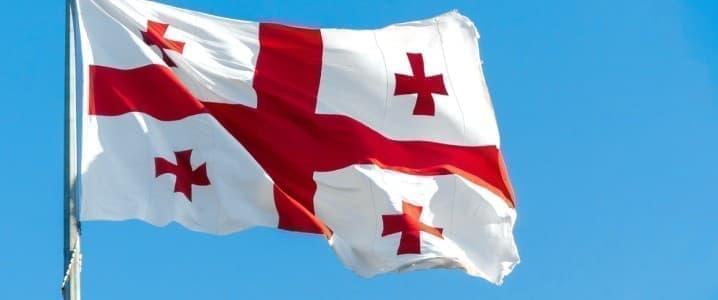There was an unannounced guest at Iranian President Ebrahim Raisi’s state funeral in late May. Alongside dignitaries from neighboring states – including Nikol Pashinyan of Armenia and Prime Minister Ali Asadov of Azerbaijan – Georgian Prime Minister Irakli Kobakhidze, accompanied by the country’s foreign minister, was in attendance in Tehran.
There was no advanced notice of the visit. Georgians learned about it from news reports and government channels the day of the funeral, which described, with little additional information, how Kobakhidze “expressed his sympathy to the Iranian people,” as he reportedly told Iran’s ambassador in Tbilisi.
Such trips by Georgian or Iranian government leaders are rare, and analysts were left to puzzle about the motives for the visit.
“Tehran prefers that Georgia is not influenced by the [Western] factor in its relations with Iran,” said Vali Kaleji, a Tehran-based expert on Iranian foreign policy in the Caucasus. “Therefore, it seems that if new approaches in Georgia’s domestic and foreign policy lead to closer relations between Georgia and Russia, Iran will welcome it.”
Unlike Armenia and Azerbaijan, Georgia does not share a border with Iran, and trade between the countries has been comparatively modest. Tbilisi and Tehran have maintained stable relations throughout the years, hitting only a few speed bumps along the way.
These days, Georgia is in the midst of a dizzying geopolitical realignment spurred by the ruling Georgian Dream party’s passage of a divisive law that can potentially enable incumbent authorities to muzzle dissent.
As its Western allies start distancing themselves politically and taking their investments elsewhere, Georgia’s path to forge closer ties with illiberal regimes like those in China and Iran seems more open than at any point in its post-Soviet history.
In a meeting on the sidelines of the World Economic Forum in Davos, Switzerland, in January, both Georgian and Iranian diplomats signaled openness to expanding economic cooperation. “Special attention was paid to the need for sustainable and stable development of the region,” Georgia’s Ministry of Foreign Affairs said in a statement about the meeting.
Of late, Tehran has strengthened commercial relations with Azerbaijan – with whom it has had a complicated relationship in recent years – as part of the expansion of the North-South trade corridor. At the same time, Iran’s generally healthy relationship with Armenia has come under some strain.
Georgia, meanwhile, has traditionally walked a fine line with Iran, a stance driven by long-standing aspirations of integrating into Western political, economic, and security institutions. While always interested in building trade ties and welcoming Iranian tourists, Georgian leaders have been wary of engaging Iran in any way that might rile the United States, which for almost the past half century has considered Tehran as a bête noire.
The desire to keep the US and European Union happy prompted Georgia to pass up some potentially lucrative joint projects with Iran in the 1990s. Former president Mikheil Saakashvili, the most ardent supporter of NATO and EU accession for Georgia, generally kept Iran at arm’s length. Even the Georgian Dream-led government temporarily suspended visa-free travel to Georgia for Iranian citizens in 2013, when the US expressed concern about potential sanctions-busting behavior.
In recent years, Georgian entities have been careful about doing deals with Iran. “Georgian companies and banks are also cautious in cooperating with Iranian companies and banks due to the concern of US sanctions,” said Kaleji, the expert on Iran’s foreign policy.
Kobakhidze’s visit to Tehran suggests that the government is less concerned now than previously about what Washington and Brussels think about the Georgian dealings with Iran.
The visit was a major surprise for many political analysts in Tbilisi. “Two months ago, we lived in a different country,” said Giorgi Sanikidze, a professor at Tbilisi’s Ilia State University, referring to Georgia’s rapid geopolitical pivot amid the implementation of the country’s foreign agents law. Despite having studied Iran’s relations with countries in the region for over three decades, Sanikidze struggled to offer a rationale for Kobakhidze’s visit beyond its public relations boost to bilateral relations, indicating that there was no clear benefit to be derived from the trip for Georgia’s strategic interests.
Iran has floated the idea of closer economic ties in the past, including by supplying Iranian gas to Georgia through Armenia, but those efforts have not resulted in concrete agreements. Even so, state data shows that gas imports to Georgia from Iran exploded by more than 600 percent in 2023. If the two countries are indeed preparing to pursue closer relations, energy supplies are a likely catalyst.
ADVERTISEMENT
But as Tbilisi’s ties with the US and EU seem set to weaken, Tehran may also be a potential source of political support for the Georgian Dream government, which was characterized in a recent Freedom House report as an increasingly authoritarian regime.
“Iran also supports these fundamentalist conservative conceptions about the ‘great past,’ how ‘we are different,’ ‘we are a great nation with this rich historical past,’” Sanikidze said. “These are, today, the slogans of Georgian Dream – it’s practically the same.”
By Brawley Benson via Eurasianet.org
More Top Reads From Oilprice.com:
- Russia and Ukraine Trade Drone Strikes on Energy Facilities
- Ageing Coal Plants Pave the Way for Renewable Revolution
- Canada Labels Iran's IRGC Terrorist Entity After Flight PS752 Tragedy


















